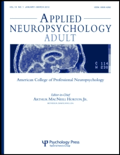
Applied Neuropsychology-Adult
Scope & Guideline
Exploring the intersection of cognition and behavior.
Introduction
Aims and Scopes
- Cognitive Assessment and Measurement:
The journal publishes studies on various cognitive assessment tools and methodologies, including traditional neuropsychological tests, digital assessments, and performance validity measures to evaluate cognitive functions across diverse populations. - Neuropsychological Rehabilitation:
Research on rehabilitation techniques and cognitive training interventions is a key focus, highlighting innovative methods such as computerized cognitive rehabilitation, telehealth approaches, and evidence-based practices for improving cognitive functions in individuals with brain injuries or neurodegenerative conditions. - Cultural and Cross-Cultural Neuropsychology:
The journal emphasizes the importance of cultural considerations in neuropsychological assessment and intervention, showcasing studies that adapt tools and methodologies for different cultural contexts and populations. - Neuropsychiatric and Cognitive Disorders:
A significant area of research includes the assessment and management of cognitive disorders associated with neuropsychiatric conditions, such as ADHD, depression, and dementia, focusing on the interplay between cognitive functions and psychological health. - Machine Learning and Technology in Neuropsychology:
The integration of technology and machine learning in neuropsychological assessments and interventions is a growing focus, with studies exploring the application of AI and advanced statistical methods to improve diagnostic accuracy and treatment outcomes.
Trending and Emerging
- Telehealth and Remote Assessments:
There is an increasing emphasis on the effectiveness and feasibility of telehealth approaches for neuropsychological assessments and interventions, particularly in response to the COVID-19 pandemic, which has necessitated remote service delivery. - Integration of Machine Learning and AI:
The application of machine learning and artificial intelligence in neuropsychological testing and cognitive assessment is rapidly emerging, with studies exploring their potential to enhance diagnostic accuracy and treatment personalization. - Holistic and Multi-Domain Approaches:
Research focusing on holistic assessments that consider cognitive, emotional, and social factors in understanding neuropsychological conditions is on the rise, reflecting a broader understanding of cognitive health. - Neuropsychology of Aging and Dementia:
There is a growing focus on aging populations, particularly in understanding cognitive decline, dementia, and the role of cognitive reserve in mitigating age-related cognitive impairments. - Cultural Adaptation of Assessment Tools:
The adaptation and validation of neuropsychological assessment tools for diverse cultural contexts is increasingly prominent, addressing the need for culturally sensitive practices in neuropsychological evaluation.
Declining or Waning
- Traditional Neuropsychological Testing:
There has been a noticeable decline in studies solely focused on traditional neuropsychological tests without incorporating modern approaches or technologies, as researchers increasingly seek innovative methods and tools to enhance cognitive assessment. - Generic Cognitive Rehabilitation Techniques:
Research focusing on generic cognitive rehabilitation strategies appears to be decreasing, as the field moves towards more personalized and targeted interventions that consider individual patient profiles and specific cognitive deficits. - Static Normative Data Studies:
The trend of publishing studies that solely present normative data without contextual application or analysis seems to be waning, as there is a growing demand for research that integrates normative data with clinical relevance and application in real-world settings.
Similar Journals

PSYCHOPHYSIOLOGY
Connecting Neuroscience with Human Experience.PSYCHOPHYSIOLOGY, published by WILEY, stands as a leading journal in the intersection of psychology and physiology, contributing significantly to our understanding of the brain and body connection since its inception in 1964. With an impressive scope covering areas such as biological psychiatry, cognitive neuroscience, and neuropsychology among others, the journal has earned multiple Q1 rankings in these critical domains as of 2023, reflecting its high impact in the field. The journal ranks particularly well in categories such as Experimental and Cognitive Psychology and neurology, indicating its status as a pivotal resource for professionals and researchers committed to advancing knowledge in psychophysiological studies. Furthermore, with an e-ISSN of 1469-8986, PSYCHOPHYSIOLOGY is accessible to a global audience, although it is not part of the Open Access movement, ensuring that its rigorous research remains a trusted source for academic excellence. By engaging with this journal, readers can expect to discover pioneering research and significant findings that push the boundaries of current understanding, making it an essential publication for those invested in the advancements of psychological and physiological sciences.
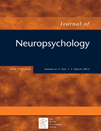
Journal of Neuropsychology
Fostering Knowledge Exchange in Neuropsychological ResearchThe Journal of Neuropsychology, published by WILEY, is a premier academic journal dedicated to advancing the field of neuropsychology and its related disciplines. With a focus on behavioral and cognitive neuroscience, this journal presents cutting-edge research that informs our understanding of psychological functions and their underlying neural mechanisms. Operating with an impressive impact factor representative of its rigorous peer-review process, the journal has established itself within the Q2 and Q3 quartiles of multiple relevant categories, including Neuropsychology and Physiological Psychology. Researchers will find the ISSN 1748-6645 and E-ISSN 1748-6653 useful for academic referencing as they explore articles that span innovative methodologies and insights into neurological conditions. Published continuously since 2007, the Journal of Neuropsychology stands as a vital resource for professionals and students alike, fostering scholarly discourse and knowledge exchange in neuropsychological research.
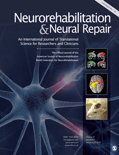
NEUROREHABILITATION AND NEURAL REPAIR
Advancing the Future of Neurorehabilitation.NEUROREHABILITATION AND NEURAL REPAIR, published by SAGE Publications Inc, is a leading journal in the fields of neurology and rehabilitation, addressing critical issues in neurorehabilitation across a broad spectrum of neurological disorders. With an impressive impact factor and consistently ranked in the Q1 category in both Neurology and Rehabilitation, this journal is esteemed for its rigorous peer-reviewed research contributing to advancements in clinical practice and rehabilitation strategies. The journal boasts an HIndex that reflects its global influence and is highly regarded among professionals and researchers, ranking in the top tiers of Scopus metrics across various categories. Since its inception in 1987, NEUROREHABILITATION AND NEURAL REPAIR has fostered innovative research aimed at improving outcomes for patients with neurological impairments, making it a crucial resource for those engaged in clinical research and therapeutic interventions. Explore this prestigious journal to stay at the forefront of developments in neurorehabilitation, with access options available for diverse readerships.
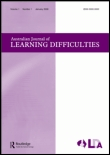
Australian Journal of Learning Difficulties
Fostering inclusive environments for all learners.The Australian Journal of Learning Difficulties, published by Routledge Journals, Taylor & Francis Ltd, serves as a vital platform for researchers, educators, and practitioners in the fields of developmental psychology, education, and social psychology. With an ISSN of 1940-4158 and an E-ISSN of 1940-4166, this journal aims to enhance understanding and research related to learning difficulties, providing insights valuable for improving educational practices and interventions. The journal is positioned in the Q2 quartile in Education and Q3 in both Developmental and Educational Psychology and Social Psychology as per the 2023 rankings, underscoring its significance within these domains. Published annually from 2008 to 2024, it encourages interdisciplinary collaboration and knowledge sharing, making it an essential resource for those devoted to advancing educational strategies and fostering inclusive learning environments. While access is not classified as open, its rigorous peer-reviewed articles contribute to evidence-based practices and policy developments in understanding and addressing learning challenges.

JOURNAL OF THE INTERNATIONAL NEUROPSYCHOLOGICAL SOCIETY
Transforming Understanding of Neurological DisordersJOURNAL OF THE INTERNATIONAL NEUROPSYCHOLOGICAL SOCIETY, published by Cambridge University Press, stands as a premier outlet for advancing the understanding of neuropsychology and its clinical applications. With a solid impact reflected in its Q1 categorizations in both Clinical Psychology and Neurology, alongside impressive Scopus rankings, this journal plays a critical role in disseminating cutting-edge research from 1995 to the present. It caters to a diverse academic community, including researchers, clinicians, and students, by providing a comprehensive platform for original research, reviews, and insightful commentaries that explore the intersection of neurological disorders and cognitive functions. Although not currently offered as an Open Access journal, its rigorous peer-review process ensures the highest standards of scholarly excellence. Engaging with the JOURNAL OF THE INTERNATIONAL NEUROPSYCHOLOGICAL SOCIETY means staying at the forefront of neuropsychological science and clinical practice.
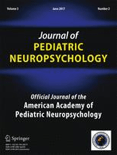
Journal of Pediatric Neuropsychology
Empowering professionals to enhance children's neuropsychological outcomes.Journal of Pediatric Neuropsychology is a pioneering academic journal dedicated to advancing the field of pediatric neuropsychology. Published by SpringerNature, this journal serves as a vital platform for researchers, clinicians, and students aiming to explore the complexities of neuropsychological development in children. With ISSN 2199-2681 and E-ISSN 2199-2673, the journal focuses on a broad spectrum of topics including cognitive processes, neurological disorders, and the impact of neuropsychology on educational and therapeutic practices. Though currently not listed as an Open Access journal, it aims to disseminate knowledge that influences clinical practices and supports interdisciplinary collaboration. The Journal of Pediatric Neuropsychology stands out for its commitment to enhancing understanding within this specialized field, making it an essential resource for professionals and researchers dedicated to improving outcomes for children with neuropsychological challenges.
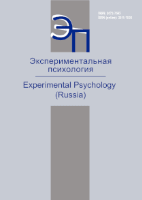
Eksperimentalnaya Psikhologiya
Empowering global collaboration in psychological science.Eksperimentalnaya Psikhologiya is a prominent open-access journal published by the Moscow State University of Psychology and Education, dedicated to advancing the field of psychology. Since its inception, the journal has offered a platform for the dissemination of innovative research in Experimental and Cognitive Psychology, as well as Neuropsychology and Physiological Psychology. The journal's commitment to open access, initiated in 2015, ensures that valuable research findings are freely available to scholars and practitioners worldwide. Although currently categorized in the Q4 quartile for 2023 within several psychology disciplines, it plays a vital role in promoting a diverse range of psychological studies and fostering interdisciplinary collaboration. With a focus on experimental methodology and cognitive processes, Eksperimentalnaya Psikhologiya provides a valuable resource for researchers, professionals, and students seeking to deepen their understanding of psychological science. The journal invites contributions from across the globe, particularly in the evolving landscapes of experimental techniques and neuropsychological research.
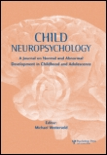
CHILD NEUROPSYCHOLOGY
Pioneering Studies in Child Cognitive and Emotional GrowthCHILD NEUROPSYCHOLOGY, an esteemed journal published by Routledge Journals, Taylor & Francis Ltd, focuses on the intricate interplay between neurological and psychological development in children. With an ISSN of 0929-7049 and an E-ISSN of 1744-4136, this journal has been a pivotal resource in the field since 1995, catering to researchers, clinicians, and educators alike. The journal holds a prestigious position in the Q2 quartile across key categories such as Developmental and Educational Psychology, Neuropsychology and Physiological Psychology, and Pediatrics, Perinatology, and Child Health as of 2023. Ranking in the 74th percentile for Pediatrics and reflecting its significant contributions, CHILD NEUROPSYCHOLOGY aims to publish groundbreaking studies that expand understanding of neurodevelopmental disorders and inform clinical practices. While not open access, the journal ensures high-quality, peer-reviewed articles that are vital for advancing knowledge and improving outcomes in child health and education. As it continues to bridge the gap between research and practice, CHILD NEUROPSYCHOLOGY remains an essential resource for those dedicated to advancing the science of child cognitive and emotional development.
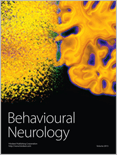
BEHAVIOURAL NEUROLOGY
Unlocking Potential: Researching the Neurological Foundations of BehaviorBEHAVIOURAL NEUROLOGY is a distinguished open-access journal published by Hindawi Ltd, dedicated to advancing the field of neurology and neuropsychology since its inception in 1988. With ISSN: 0953-4180 and E-ISSN: 1875-8584, this journal provides a platform for innovative research and interdisciplinary studies that explore the intricate connections between behavior and neurological processes. Housed in the Netherlands, BEHAVIOURAL NEUROLOGY enjoys a commendable reputation, boasting impressive quartile rankings of Q2 in various medical and psychological categories, reflecting its significant contribution to the literature with a focus on clinical neurology and physiological psychology. The journal's rigorous peer-review process ensures that published works meet high academic standards, making it an essential resource for researchers, clinicians, and students seeking to deepen their understanding of neurological disorders and cognitive function. As of 2023, it ranks in the 80th percentile in neuropsychology, further underscoring its impact and relevance in the scientific community. For those interested in accessible knowledge, BEHAVIOURAL NEUROLOGY's commitment to open access facilitates the dissemination of groundbreaking research, allowing a wider audience to engage with critical advancements in the field.
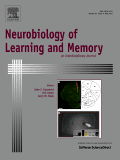
NEUROBIOLOGY OF LEARNING AND MEMORY
Charting New Territories in Cognitive NeuroscienceNeurobiology of Learning and Memory is a prestigious journal dedicated to the exploration of the neural mechanisms underlying learning and memory processes. Published by Academic Press Inc Elsevier Science, this journal boasts a strong reputation within the field, as evidenced by its impressive impact factor and high quartile rankings in multiple categories, including Q1 in Behavioral Neuroscience and Q2 in Cognitive Neuroscience. Having provided a platform for groundbreaking research since its inception in 1995, the journal aims to disseminate influential findings that further our understanding of cognitive processes, shaped by robust empirical studies and theoretical developments. Researchers and professionals in neuroscience, psychology, and related disciplines will find invaluable insights and advancements that underscore the journal's commitment to fostering knowledge and innovation within these fields. While it currently operates under a subscription model, its comprehensive coverage of crucial topics positions it as a vital resource for those engaged in the intricate study of learning and memory.